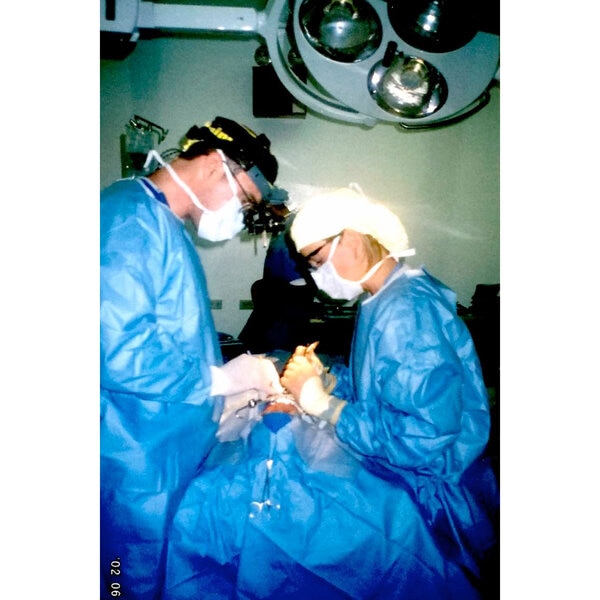Cary Deuber Reveals How to Tell if Your Plastic Surgeon Is the Real Deal
The Real Housewives of Dallas pal gives pro tips for understanding tricky board certifications.

We all want the best when it comes to plastic surgery.
"My doctor is board certified."
"Mine is double board certified."
"Mine is triple board certified!"
Wow! Sounds like good, better, and best ... but is that what it really means, though?
Whether considering mandatory or elective surgery, we all know that “board certification” is a key positive indicator in the doctor selection process. Board certification originally arose as a patient protection criteria to ensure that doctors were adequately trained in whatever field they were practicing. But what most prospective patients don’t realize is that this stamp of “board certification” has recently been used as a competitive marketing technique within the medical industry over the past several years.
In general, many of these "boards" are private corporations, whose members and governors are the very doctors being certified by that board. That almost sounds like a fraternity! So where can you turn to in order to know what to really trust?
As I always say, you have to do your research. Always check credentials: where the physician went to school, where he or she did their residency, what exactly they are certified in. What do they do the most of? What type of surgery? Getting references from friends is important as well, as experienced word of mouth is very powerful. Look for consistent patient reviews online that include recent positive ratings within the last few months. This is why we prioritize even our own patient feedback on reputable platforms such as Real Patient Ratings and Real Self.
If your prospective physician does not have these kinds of resources, though, then you will want to do a little more digging.
Enter the American Board of Medical Specialties (ABMS), established in 1933. Its founding members were: the American Board of Dermatology, the American Board of Obstetrics and Gynecology (OB-GYN), the American Board of Ophthalmology and the American Board of Otolaryngology (ENT). Over the years, more and more specialties were admitted to the ABMS up through today, where there are currently 24 member boards comprising many specialties and subspecialties in medicine.
From the ABMS website: “When a physician or surgeon is Board Certified by an ABMS specialty board, it means he or she has chosen to achieve expertise in a medical specialty or subspecialty by meeting the profession-driven standards and requirements of one (or more) of the 24 ABMS certifying boards."
The plain fact is that when it comes to plastic surgery there is only ONE plastic surgery board that is recognized by the ABMS, and that is the American Board of Plastic Surgery. But what about these other "boards" my doctor might list? Well, let’s break it down:
"Cosmetic surgery" is indeed a branch of "plastic surgery", but these two terms do not mean the same thing when it comes to credentials: There is no ABMS-member board that exists specifically for "cosmetic surgery". The highest standard for your cosmetic or aesthetic surgeon is the American Board of Plastic Surgery.
Now, does it really matter if your physician's board is on the ABMS member list? That’s for you to decide. Every state has a licensing agency that issues and renews your doctor’s license to practice medicine. In Texas, it’s the Texas Medical Board (TMB), and as far as these experts are concerned, the ABMS membership is important enough that they will only report a doctor’s ABMS boards. Suddenly your doctor who proudly advertises as being double or triple board certified can really only list one board with the state?! Hmmm. Definitely something to think about.
So, when you are researching your physician, don’t just take his or her word for their credentials — it’s KEY to look them and their license up here with your respective state's medical board to see if the “boards” that they are referring to are official MEMBER BOARDS recognized by the American Board of Medical Specialties.
If your physician's "board" is not listed with the ABMS, then it would be wise to keep researching to make sure that you are comfortable with the amount of time that they have practiced and been professionally trained to complete your procedure.
As I mentioned, it's all about how comfortable you are with your physician and their education and experience. For example, true plastic surgeons go through 6-8 years of specialty training after medical school, whereas pure cosmetic surgeons can go through 0-2 years after an unrelated residency.
As a patient advocate above all else, my concern is for patient safety and positive patient outcomes.
The choice of who to go to for a surgery can be very overwhelming, but each of us has the tools to find the best expert possible to make us feel the most comfortable and at ease.
Again, here is the link to look up any doctor in Texas — from training, credentials, ABMS board certification, complaints and disciplinary actions.




